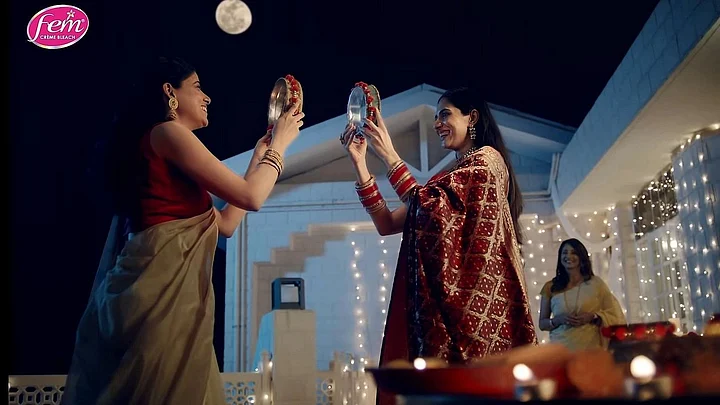Ahead of the festive season, Fem has rolled out an ad featuring a same-sex couple where two young women are getting ready for their first Karwa Chauth. It follows a brief conversation about the significance of Karwa Chauth before an elderly female member of the family walks in with festive clothes for each of them. In a surprising plot twist, it appears that these women are partners as they conclude the traditional ceremony with the quintessential breaking of each other’s fast.
Karwa Chauth celebrations in today’s young India have transcended gender and relationships. It was once a ceremony that tested a woman’s devotion, love, and ability to sacrifice. Today, it symbolizes equality and mutual respect in a relationship where often both men and women pray for each other’s long and healthy life. Why then is the same practice frowned upon if it is being observed by two female partners? Or two male partners? Or by any other relationship that is “conventionally” seen to be outside the purview of that of a husband-wife bond?
If anything, should India not be proud that the next generation of youngsters is evolving their identities with their roots still firm in their place? Or, three years after the scrapping of Article 377, are we as a society proposing that there should be a different set of rules for those falling out of the “conventional” marriage? What that will essentially do is again “other” those who have been “othered” for years now.
In this advertisement, Fem has simply tried to celebrate a community that has been forced to live an invisible life for years now. The ad has rooted India’s progressive identity and attitude in its pride and belief in customs and tradition.
But Twitteratis appear divided over its progressive approach. While some have criticized the brand for promoting same-sex relationships, many have applauded the organization for encouraging “parity” and equality.
Meanwhile, this advertisement is the third ad that has faced controversy in a week. Earlier, FabIndia’s new Diwali collection, ‘Jashn-e-Riwaaz’ faced similar troubles around censorship. The advertisement by Ceat Ltd where actor Aamir Khan advises people not to burst crackers on the streets has also faced some backlash from the community. More recently, Manyavaar’s ad around “Kanyamaan” had also faced mixed opinions.
Each of these advertisements has given us food for thought about the identity of a progressive Indian. It makes us think about how they evolve their relationships with their identity and why we are canceling their pride in their culture and tradition?
